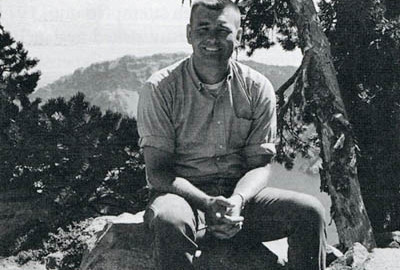In ’79, ’80, and ’81 I used the raft and the African Queen. In 1981 the Park Service bought a new Zodiac boat probably 12 feet long. We used that one a little bit. In June or July, 1981, the African Queen sank. They [NPS] tied it up at Cleetwood and apparently it wasn’t tied securely, so it came loose and was dashed against the rocks. I’ve got pictures of the wreckage. In May, 1982, the Park Service launched a new boat. It was also a pontoon boat to replace the African Queen. We had a hatch in the floor where we could sample straight through. That about covers the boats we used.
How did you meet John Salinas?
John Salinas was a seasonal interpreter. He was originally from California, and I think was teaching high school in Grants Pass. In the summers he and Marilyn would come up to Crater. They had two children. I got to know John and the family real well. They had me down for supper and were very nice to me. I think of all the people that worked with me, John showed the greatest promise. He was a science teacher and he was working on a masters in Chemistry at Oregon State. He was very much oriented towards science and was the person I enjoyed working with most. He showed a lot of interest and enthusiasm. He was also a hard worker, too. When I got him assigned to me I felt it was going to be a good day on the lake.
Were your findings presented formally during these years?
Yes I gave two papers at the second conference on scientific research in the national parks in 1979 at San Francisco. Mark Forbes was a co-author on one of my papers. That paper was about the diminishing optical properties of Crater Lake, or as indicated by the decreasing Secchi disk visibility measurements. The other paper was on phytoplankton. I co-authored that one with Stan Geiger. At the beginning of the [summer] season I would give a talk to the seasonal staff at Crater Lake on my work and what it meant. I had mixed feelings about those presentations. Some of the people were enthusiastic, but other people were skeptical or angry at me for suggesting that the lake may be changing. I think some people felt that I was insulting the National Park Service for not doing its job and protecting the lake. I tried to make my talks as objective and focused as possible on my work. Some people received my presentations negatively and didn’t like my findings. Other people were very much interested and encouraged me to do more work.


